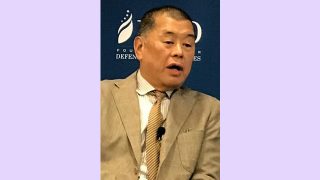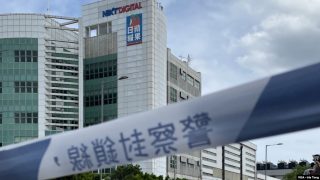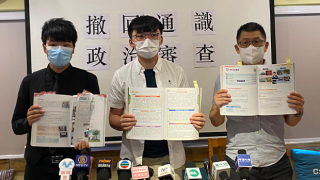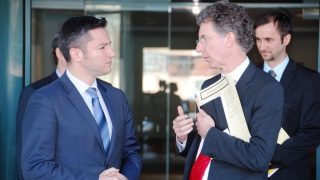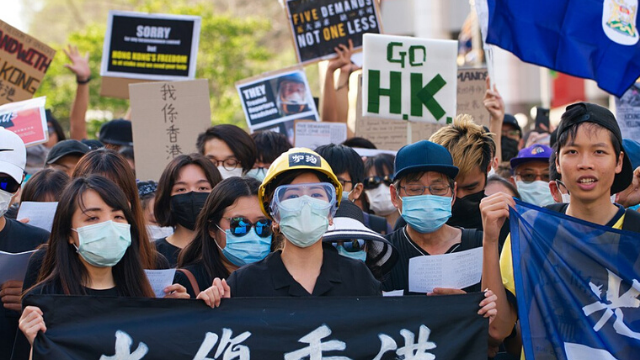
Chinese President Xi Jinping on Tuesday signed a presidential order to impose draconian security legislation on Hong Kong, with effect from 11.00 p.m. local time, an hour before the July 1 handover anniversary.
The full text of the Law of the People’s Republic of China on Safeguarding National Security in the Hong Kong Special Administrative Region, which bans a vaguely defined and all-encompassing slew of actions including many seen during last year’s pro-democracy protests and anti-extradition movement, was published in Chinese only in the Hong Kong government gazette and signed by its chief executive Carrie Lam.
Beijing’s Hong Kong and Macao Affairs Office (HKMAO) likened the national security law to a “sharp sword” hanging over the heads of anyone “endangering national security.”
However, the law also targets anyone in the world committing actions within its scope, regardless of whether they live in Hong Kong or are its permanent residents.
However, many of the actions and activities banned in the law could include a number of actions taken by protesters last year in the face of widespread police violence meted out even to peaceful mass marches.
Trials under the law may be held in secret if “state secrets” are deemed to be involved. The mainland Chinese authorities have typically employed a highly elastic definition of what constitutes a state secret, and national security charges are frequently leveled at rights activists, authors and academics and human rights lawyers for something they posted online.
Anyone suspected of “crimes” under the law can be issued with a travel ban, their passport confiscated and their assets frozen.
Businesses, groups and other legal entities suspected of breaching the law may be shut down or have their licenses to operate revoked, echoing a process used by authorities in mainland China to revoke human rights lawyers’ license to operate as a business.
The law may also be used to require media or online service providers to remove copy deemed to harm national security, and to reveal details of its source.
Anyone “causing residents of the Hong Kong Special Administrative Region to have misgivings about the Central People’s Government through various unlawful means,” will also be pursued under the law, a provision that also could potentially be used to target the media and anyone commenting on social media.
Judges in national security trials may be appointed by Lam. Cases will be heard by three judges.
‘Foreign forces’
Any activity that is deemed to have used “force or the threat of force” to advocate independence for Hong Kong would be covered by the law, as would any financial aid, help or other donations to such a cause.
Anyone using or preparing explosive devices like the Molotov cocktails in widespread use by frontline protesters fighting back against riot police would fall within the law’s remit.
Potential targets could also include anyone advocating independence or self-sufficiency for Hong Kong, and anyone promoting, donating to, or helping such groups in any way.
The law also targets those “seriously interfering with, obstructing or sabotaging the Central Authorities of the People’s Republic of China or the performance of functions by the organs of the Hong Kong Special Administrative Region, which could mean obstructing almost any form of official business.
A clause about “attacking, damaging or destroying [government] places and facilities” would encompass anyone vandalizing government property, which also occurred during last year’s protests, as well as anyone funding or helping anyone to do these things.
Anyone vandalizing the MTR or ticket machines, anyone using fire hydrants, or interfering with a CCTV camera, all of which became regular features of protests, could also fall into the law’s net, as could anyone helping, funding or donating to people doing such things.
People offering lifts to protesters or assisting them in other ways could also be targeted.
The articles on “collusion with foreign forces” refer to anyone seen to be working with overseas organizations or individuals, not just to obtain state secrets, but also to “obstruct” Hong Kong government law or policy.
Anyone colluding with foreign powers to impose sanctions on Hong Kong will also be targeted, which was a key plank of the pro-democracy movement’s strategy, culminating in the passing of the Hong Kong Human Rights and Democracy Act in the U.S. in November 2019.
Translated and edited by Luisetta Mudie.
Source: Copyright © 1998-2016, RFA. Used with the permission of Radio Free Asia, 2025 M St. NW, Suite 300, Washington DC 20036. https://www.rfa.org.
